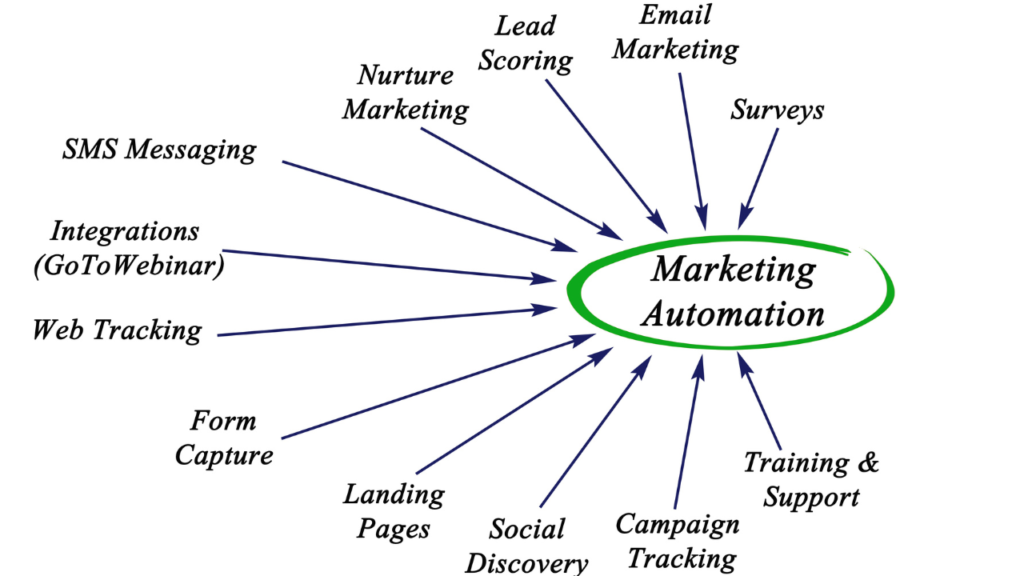Introduction to AI Solutions for Sales Automation
In today’s fast-paced business environment, AI solutions for sales automation have emerged as a game-changer, transforming the way organizations approach their sales processes. By leveraging advanced technologies, companies can streamline operations, enhance productivity, and ultimately drive revenue growth. The integration of AI into sales automation is not just a trend; it is becoming a necessity for businesses aiming to stay competitive in a crowded marketplace.
The importance of AI in modern sales processes cannot be overstated. With the ability to analyze vast amounts of data, AI tools can provide insights that were previously unattainable. This capability allows sales teams to make informed decisions, tailor their strategies, and engage customers more effectively. As customer expectations evolve, the demand for personalized experiences has never been higher. AI enables businesses to meet these expectations by automating routine tasks, freeing up valuable time for sales professionals to focus on building relationships and closing deals.
Moreover, AI-driven solutions can significantly reduce human error, ensuring that sales processes are not only efficient but also accurate. From lead generation to customer follow-ups, AI technologies can optimize every stage of the sales funnel. As organizations continue to adopt these innovative tools, the landscape of sales automation is set to evolve, paving the way for more intelligent and responsive sales strategies.
Key AI Technologies for Sales Automation

In the realm of sales automation, several key AI technologies are transforming how businesses operate and engage with customers. Machine Learning and Predictive Analytics stand at the forefront, enabling sales teams to analyze vast amounts of data and identify patterns that inform decision-making. By leveraging historical sales data, these technologies can forecast future sales trends, allowing organizations to allocate resources more effectively and optimize their strategies.
Natural Language Processing (NLP) is another critical component, facilitating more intuitive interactions between sales teams and customers. NLP enables the analysis of customer communications, whether through emails, chat messages, or social media, to extract valuable insights about customer preferences and sentiments. This technology not only enhances understanding but also helps tailor sales pitches to meet individual customer needs.
Moreover, the automation of routine tasks is a game-changer for sales professionals. By automating repetitive activities such as data entry, follow-up emails, and appointment scheduling, sales teams can focus on high-value tasks that require human insight and creativity. This shift not only boosts productivity but also improves job satisfaction among sales personnel, as they can dedicate more time to building relationships and closing deals.
As these technologies continue to evolve, their integration into sales processes will become increasingly seamless, driving efficiency and effectiveness in ways previously unimaginable.
Enhancing Customer Engagement with AI

Enhancing customer engagement is paramount for driving sales success. Artificial Intelligence (AI) plays a pivotal role in achieving this goal by enabling businesses to create personalized customer interactions that resonate with individual preferences and behaviors. By leveraging data analytics, companies can tailor their marketing strategies to meet the unique needs of each customer, fostering a deeper connection and increasing loyalty.
One of the most significant advancements in customer engagement is the use of chatbots and virtual assistants. These AI-driven tools provide instant responses to customer inquiries, ensuring that potential buyers receive the information they need without delay. This not only improves customer satisfaction but also allows sales teams to focus on more complex tasks, ultimately enhancing productivity. Furthermore, chatbots can operate 24/7, providing support and engagement at any time, which is crucial in today’s fast-paced digital environment.
Another innovative application of AI in customer engagement is sentiment analysis. By analyzing customer feedback across various platforms, businesses can gain valuable insights into how their products and services are perceived. This analysis helps identify areas for improvement and allows companies to adjust their strategies accordingly. Understanding customer sentiment enables organizations to proactively address concerns, thereby enhancing the overall customer experience.
- Personalized marketing campaigns based on customer data.
- Real-time assistance through chatbots.
- Sentiment analysis to gauge customer satisfaction.
By integrating these AI technologies, businesses can significantly enhance their customer engagement strategies, leading to improved sales outcomes and stronger relationships with their clientele.
Streamlining Sales Processes Using AI

AI technologies are transforming the way sales teams operate, making processes more efficient and effective. One of the most significant advancements is in automated lead generation and qualification. By leveraging algorithms that analyze vast amounts of data, AI can identify potential leads based on specific criteria, such as demographics, online behavior, and past interactions. This not only saves time but also ensures that sales teams focus their efforts on the most promising prospects.
Furthermore, AI-driven sales forecasting is revolutionizing how businesses predict future sales trends. By utilizing historical data and current market conditions, AI can provide accurate forecasts that help sales teams make informed decisions. This predictive capability allows organizations to allocate resources more effectively, ensuring they are prepared for fluctuations in demand.
Another critical aspect of streamlining sales processes is the optimization of sales pipelines. AI tools can analyze each stage of the sales funnel, identifying bottlenecks and areas for improvement. By automating routine tasks, such as follow-up emails and appointment scheduling, sales representatives can dedicate more time to building relationships and closing deals. This not only enhances productivity but also leads to higher conversion rates.
In summary, the integration of AI in sales processes is not just a trend; it is a necessity for businesses aiming to stay competitive. By automating lead generation, enhancing forecasting accuracy, and optimizing sales pipelines, organizations can achieve greater efficiency and drive revenue growth.
Data-Driven Decision Making with AI

In the realm of sales, data-driven decision making has become a cornerstone for success, and AI plays a pivotal role in this transformation. By harnessing the power of analyzing sales data, organizations can uncover valuable insights that drive strategic initiatives. AI algorithms sift through vast amounts of data, identifying patterns and trends that human analysts might overlook. This capability allows sales teams to make informed decisions based on real-time information rather than relying solely on intuition.
One of the most impactful applications of AI in sales is through predictive analytics. This technology enables businesses to forecast sales outcomes with remarkable accuracy. By examining historical data, AI can predict future sales trends, helping teams allocate resources more effectively and prioritize high-potential leads. This not only enhances efficiency but also maximizes revenue potential.
Moreover, the integration of real-time reporting and dashboards provides sales professionals with immediate access to critical metrics. These tools allow teams to monitor performance, track KPIs, and adjust strategies on the fly. With AI-driven insights, sales teams can respond swiftly to market changes, ensuring they remain competitive in a fast-paced environment.
Ultimately, leveraging AI for data-driven decision making empowers sales teams to operate with greater precision and agility. By transforming raw data into actionable insights, organizations can enhance their overall sales strategy, leading to improved outcomes and sustained growth.
Implementing AI Solutions in Sales Teams

Integrating AI solutions into sales teams requires a strategic approach to ensure seamless adoption and maximum effectiveness. One of the first steps is integration with existing CRM systems. This allows sales teams to leverage their current data while enhancing it with AI capabilities. By connecting AI tools to established platforms, organizations can streamline workflows and improve data accuracy.
Training and adoption strategies are crucial for successful implementation. Sales teams must be equipped with the knowledge and skills to utilize AI tools effectively. This can involve:
- Hands-on training sessions that focus on practical applications of AI in daily sales activities.
- Ongoing support from AI specialists to address questions and troubleshoot issues as they arise.
- Creating a culture of innovation where team members feel encouraged to experiment with AI tools and share their experiences.
Moreover, addressing ethical and privacy concerns is paramount. As AI systems handle sensitive customer data, it is essential to establish clear guidelines and protocols to protect this information. Sales teams should be trained on:
- Data privacy regulations such as GDPR and CCPA, ensuring compliance in all AI-driven processes.
- Best practices for data handling to maintain customer trust and safeguard sensitive information.
- Transparency in AI usage, informing customers about how their data is utilized and the benefits they receive.
By focusing on these key areas, organizations can successfully implement AI solutions within their sales teams, driving efficiency and enhancing overall performance.
Future Trends and Innovations in AI for Sales Automation

The landscape of sales automation is on the brink of significant transformation, driven by emerging technologies that promise to enhance efficiency and effectiveness. Artificial Intelligence is evolving rapidly, with advancements in machine learning and deep learning paving the way for more sophisticated algorithms that can analyze vast amounts of data with unprecedented accuracy. This evolution will enable sales teams to harness predictive analytics not just for forecasting but also for identifying new market opportunities and customer segments.
Moreover, the integration of Augmented Reality (AR) and Virtual Reality (VR) into sales processes is gaining traction. These technologies can create immersive experiences for potential customers, allowing them to visualize products in their own environments before making a purchase. As these tools become more accessible, they will likely redefine how sales presentations are conducted, making them more engaging and interactive.
However, with these advancements come challenges. Data privacy and ethical considerations will remain at the forefront of discussions surrounding AI in sales. Companies must navigate the fine line between leveraging customer data for personalized experiences and respecting individual privacy rights. Additionally, the potential for bias in AI algorithms poses a risk that organizations must address proactively to ensure fair treatment of all customers.
As we look to the future, the opportunities for AI in sales automation are vast. Companies that embrace these innovations will not only streamline their operations but also enhance customer satisfaction through tailored experiences. The future of AI in sales automation is bright, promising a new era of efficiency, engagement, and ethical responsibility.



